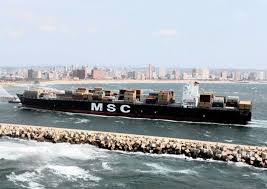Introduction: A New Chapter for South African Rail
The landscape of South Africa’s logistics and transport is gearing up for a major shift. MSC, the world’s top container shipping operator, has just secured provisional approval to run trains on the country’s rail system, marking a significant milestone in revitalizing South Africa’s freight infrastructure.
The Push for Private Sector Involvement in Rail Transport
South Africa has long grappled with challenges in its rail network, which has been a bottleneck in economic growth. Enter private sector players, spearheaded by MSC alongside nine other companies, stepping into the rail operating scene with approved slots to modernize and rejuvenate services.
This movement isn’t just happenstance; it aligns closely with global economic recommendations encouraging countries to invite private investment into critical infrastructure sectors. The World Bank has highlighted that efficient, quality infrastructure—accessible and affordable—can cut constraints on businesses while improving daily life for households.
The private sector’s growing footprint is already showing promising results, with experts pointing out that areas such as transport and energy are ripe for business-led transformation.
MSC’s Entry: Impact and Expectations
MSC’s provisional license to operate trains symbolizes more than just a contract; it is a key element within South Africa’s broader rail reform plan. The initiative aims to tackle the inefficiencies that have hindered freight movement, especially the export-heavy mining sector, which has been strained by port and rail capacity issues.
The new train operators are slated to begin services between late 2026 and 2028, with ambitious targets to increase freight rail volumes from 160 million tons to 250 million tons by 2030. This represents a huge leap in haulage capacity, one that could directly ease logistics headaches of multiple industries.
Revamping Ports and Rail to Boost Freight
Transnet, the state-owned rail and port entity, has come under fire for frequent operational troubles, ranging from theft to aging infrastructure. Yet, recent government interventions and reforms are putting wheels back on the tracks, literally. Notably, a R285 million investment is underway to quadruple container handling capacity at Richards Bay’s Bayvue precinct, in partnership with private firms. This is part of a long-term strategy to create a more resilient and expansive logistics system.
Policy Backing and Strategic Frameworks
The National Development Plan (NDP) emphasizes the crucial role of rail transport in national growth strategies. Given the financial constraints faced by the government, private funding is not just welcome but essential to realize these infrastructural ambitions. While licensing and tariff regulation remain government prerogatives, there’s a clear drive to encourage competition and widen affordable access to quality rail services.
Key Investment Pillars in South African Rail
- Private sector participation to supplement government resources.
- Expansion and modernization of rail capacity to handle increased freight.
- Enhancement of port infrastructure for efficient cargo handling.
- Supportive policies aimed at promoting competition and affordability.
Table: Forecast for South Africa Freight Rail Volumes (Millions of Tons)
| 연도 | 화물 물량 |
|---|---|
| 2023 (est.) | 160 |
| 2030 (target) | 250 |
향후 전망: 이것이 물류에 미치는 의미
The reinvigoration of South Africa’s rail network via private operators like MSC is a game-changer for the logistics sector. Increasing rail capacity not only eases freight congestion but also creates a more reliable supply chain for exporters and domestic industries alike. Bulk goods, containers, vehicles, and large cargo can move more efficiently, lowering transport costs and transit times.
This evolution could ripple through the regional trade ecosystem, enhancing cross-border connectivity and boosting South Africa’s role as a critical logistics hub on the continent.
화물 운송에 있어 정보에 입각한 선택하기
Even with positive industry news and glowing reviews around such investment projects, nothing beats the first-hand experience in assessing logistics solutions. Platforms like GetTransport.com empower users to select from global freight and transportation options, ensuring competitive pricing and service transparency. Whether handling office relocations, bulky cargo, or vehicle transportation, the convenience offered simplifies complex logistics challenges.
By offering extensive choices combined with affordable pricing, GetTransport.com allows shippers to make confident decisions without unnecessary expenses or unpleasant surprises. Book your Ride at GetTransport.com to experience straightforward, reliable cargo movement tailored to your needs.
Global Logistics Implications
While the railway reform in South Africa may not immediately shake global logistics foundations, its impact is crucial regionally and nationally. Efficient rail freight supports exports and imports, streamlines distribution, and reduces dependency on road haulage. These improvements resonate with the goals of any global freight forwarder or logistics provider tracking emerging transport infrastructure developments.
GetTransport.com remains committed to monitoring such vital shifts to keep pace with the evolving world of cargo transportation. Start planning your next delivery and secure your cargo with GetTransport.com.
요약
The recent approval allowing MSC to operate trains on South Africa’s rail network signals a noteworthy stride in addressing the country’s longstanding logistics hurdles. This move exemplifies how private sector involvement is crucial in revitalizing freight rail, increasing capacity, and enhancing operational efficiency. Upcoming infrastructure investments promise fourfold increases in port container handling abilities and a substantial hike in rail freight volume by 2030. These developments promise to transform the logistics landscape by creating more robust, reliable modes of transport for a broad range of cargo, from bulky goods to international shipments. In this dynamic environment, GetTransport.com offers an efficient, affordable platform to navigate these evolving logistics challenges, making global, regional, and local freight transportation simpler and more accessible for all types of movers and shippers.

 MSC Joins South Africa’s Rail Network Revamp, Boosting Freight and Logistics">
MSC Joins South Africa’s Rail Network Revamp, Boosting Freight and Logistics">